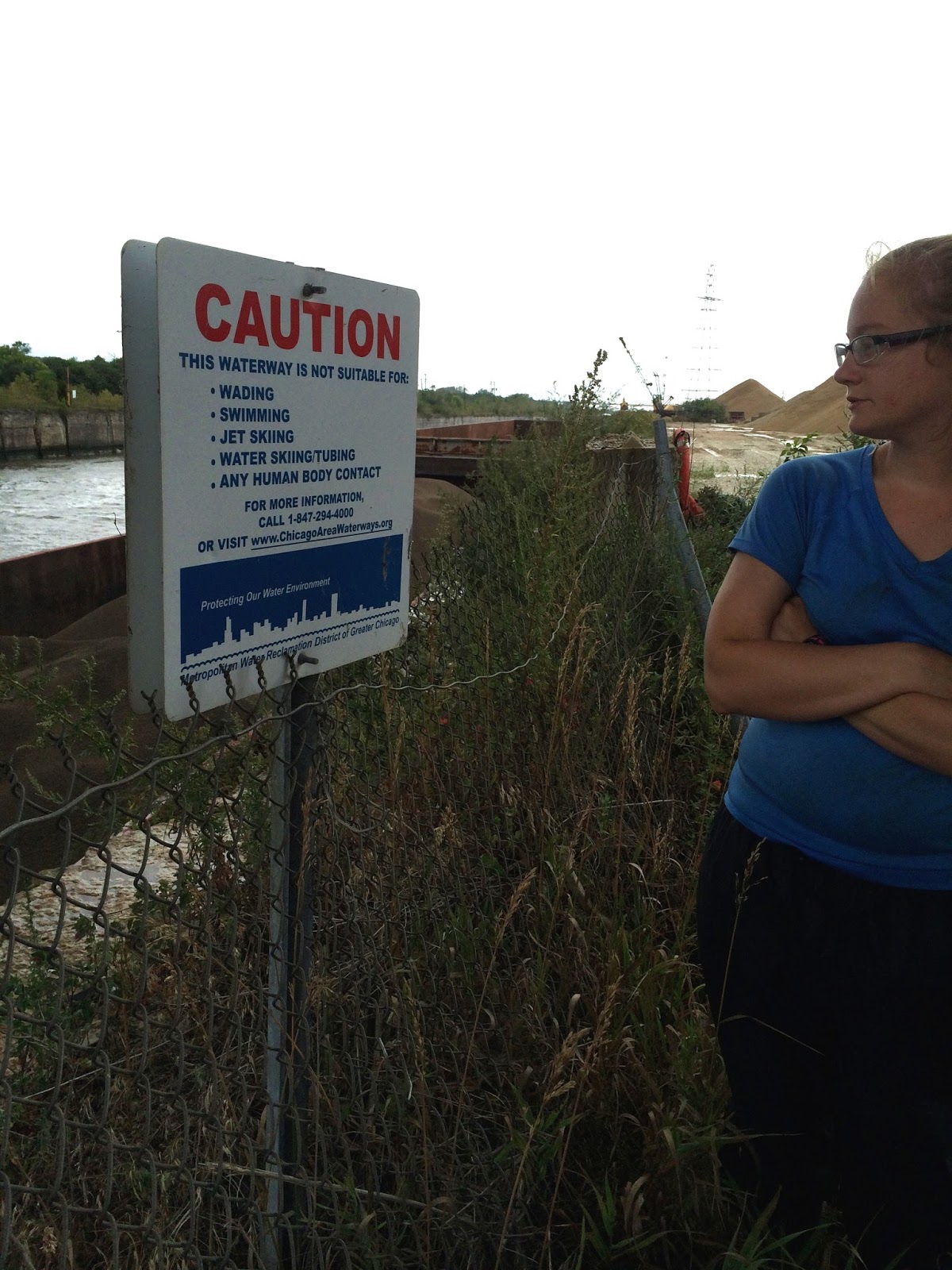There are inherent risks associated with river recreation, which all of the Paddle Forward expeditioners have experience managing. For this reason, we always wear PFD's and are careful around the water while paddling, recognizing and respecting its great power. The Chicago River and Des Plaines River present a new hazard that I have never had to think about during any paddling I have done in the past. The water itself is a hazard. All along the way there are signs that say:

CAUTION
THIS WATERWAY IS NOT SUITABLE FOR:
- Wading
- Swimming
- Jet Skiing
- Water Skiing/Tubing
- Any Human Body Contact
This means that along the stretch between Chicago, and a ways downstream, we had to take extra precautions. We were careful as we were getting in and out of our boats not to splash ourselves. If we lifted our boats out of the river and our hands got wet, we were sure to wash them. We kept careful attention to minor cuts and abrasions, which are inevitable on this type of expedition, to keep them extra clean since the river presented a high risk of infection. We could not rinse our bandanas, clothes, feet, outside of our water bottles, or even the inside of the canoes with river water, as we usually do on a canoe trip.
How are these rivers so contaminated that human contact is not advisable? Why are these rivers different from other rivers in the U.S.?
The Metropolitan Water Reclamation District of Great Chicago filters, but does not disinfect, most of its wastewater before sending it downstream. It is the only major water reclamation district in the country that practices this. Between 60 and 85% of water in the Chicago area water system comes from human waste. This means that bacteria counts of fecal coliform, which can cause diseases such as e. coli, salmonella, typhoid, cholera, tuberculosis, and other diseases, can be as high as 34,000 per 100 milliliters. A count of 300 fecal coliform per 100 milliliters is considered safe for recreation.
Since the Clean Water Act of 1972, which requires facilities releasing wastewater to have a permit, water quality in the Chicago area water system has improved significantly. The construction of Deep Tunnel, an underground wastewater storage system, which holds 2.3 billion gallons of wastewater until it can be treated and released, has helped control the discharge of untreated sewage into the waterways. Chicago has a combined sewer system, so both stormwater runoff and water flushed down toilets and sinks is ultimately sent to Deep Tunnel. However, when large rain events occur, which is happening more and more frequently due to climate change, this system is overwhelmed, and it forces the city to release untreated wastewater into our waterways. This water ends up both in the river system and in Lake Michigan--the source of Chicago's drinking water. Construction is currently underway to increase Deep Tunnel's capacity to from 2.3 billion gallons 17.5 billion gallons by 2024.
I was not aware of the water quality issues of the Chicago and Des Plaines Rivers, and it is very concerning that we are letting this happen. However, it also seems that the solution is neither mysterious nor complicated. Yes, it will require a significant investment to begin disinfecting wastewater and to install various forms of green infrastructure to help control runoff throughout the city of Chicago but really, this goal is not unattainable. Rather, it would get the Chicagoland area merely up to speed with the rest of the country.
The Illinois EPA is considering beginning to disinfect wastewater, and much of this shift is happening because of increased recreation on the Chicago area water systems, and the recognition of the need to protect these citizens from disease. This shift highlights the political influence that outdoor recreation can have. By simply going outside and enjoying the natural amenities that exist in our backyard, government agencies and representatives must recognize the role that these areas play in our daily lives, and in turn create policy and practices that reflect the value that citizens place on these resources. It is Wild River Academy's hope that by paddling the Chicago, Des Plaines, and Illinois Rivers, we highlight the recreation and learning opportunities that abound along these water trails. So join us in utilizing, appreciating, and exploring your backyard! And bring some friends along!
No comments:
Post a Comment